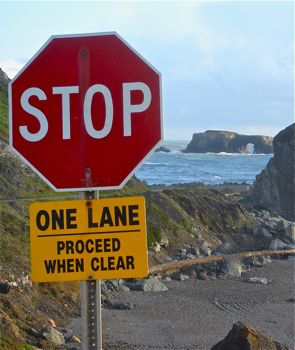LGS #73: Do You Judge Judging?
During a workshop on Conflict Resolution I was looking at an overhead slide listing internal states and conditions prerequisite to effective conflict resolution. On this list was “A non-judging mind.”
I sat there wondering how one was to begin if he or she did not possess such a mind. I can’t claim to.
It’s easy to unconsciously view such an ideal as a condition we must and are unable to meet. In this example, this response places the possibility of conflict resolution out in the future. It goes something like this: “When I can be non-judging, then I will practice this resolution process.” Or: “I am not able to stop judging so I can’t effectively do this resolution process.”
Remember that judging is an emotional reaction, while discernment refers to clear and neutral assessment.
I judge sometimes. My discerning mind can flip into judging. I used to judge myself for judging. This type of resistance creates a loop. The loop generates energy that blocks real feeling and flexible response.
The ideal of not judging others intensifies judging if we judge ourselves for not being able to actualize it. What to do?
Suppression of judgmental feelings is not the answer. In the Conflict Resolution workshop, I had a wonderful conversation with a handful of bright and insightful practitioners. Someone asked, “How do you feel about ‘making nice.’ ” Everyone expressed frustration and annoyance about being in situations in which people pretend to be nice instead of presenting themselves as they really are. This duplicity creates complication, stuck energy, and unclear social signals. It retards resolution of issues and prevents sincerity.
Resisting feeling just keeps it stuck in there. Being honest about judging works better than pretending it isn’t happening.
You can intentionally become rather indifferent to your inner soundtrack, with full awareness of it, the way you might observe your mind during meditation without being drawn into it. It’s like noticing that a dog is barking without reacting or resisting.
I want to make this more concrete. I’m asking myself how I deal with it when I start to judge. Suppose I enter a session with a client and a negative judgment comes up in my mind:
- I notice my feeling of judgment.
- I do not “run” it in my mind or body.
- I do not judge myself for it and create a loop.
- I do not recoil from it or bury it.
- I relax and stay in my body.
- I focus on my heartfelt intention to bring myself into the present by fully committing myself to being of service.
- I place myself in the client’s court, to operate in his or her behalf.
- My thoughts, beliefs, attitudes, judgments and opinions become unimportant to me. They are irrelevant to the session.
- I do not fight with them or ignore them but allow them to recede and to become unimportant.
- During the course of the session, as I come to know the client’s inner workings, my judgment almost always evaporates, leaving compassion in its wake.
An astute client had a breakthrough insight: “I realized I do not need to be able to love myself all the time to stop my pattern. I do not need to be perfect. I do not need to know that I will never do it again. There are no preconditions–I just need to stop and do something else in that one moment. And do this in every moment I can until it becomes habit.”
Effective conflict resolution requires compassionate self-observation and acceptance. This holds for internal conflict as well as conflict with others. By learning to acknowledge, accept, and remain present with our internal conflicts, we become able to hold space for others to be fully vulnerable and process their conflicts. Effective work hinges on being able to hold our own conflicts and remain constructive. Self-awareness is king.
Becoming aware of it when we are judging and accepting ourselves allows us to move toward the ideal of non-judgement instead of disqualifying ourselves or placing the ideal in a receding future.
What do YOU judge the most in others?
How skilled are you at noticing the ways you do the same thing yourself, and how you feel when you do?


